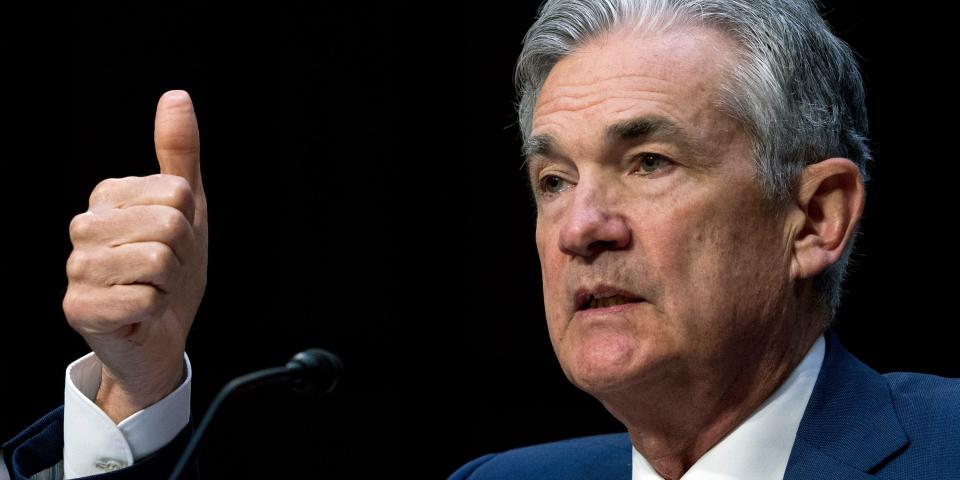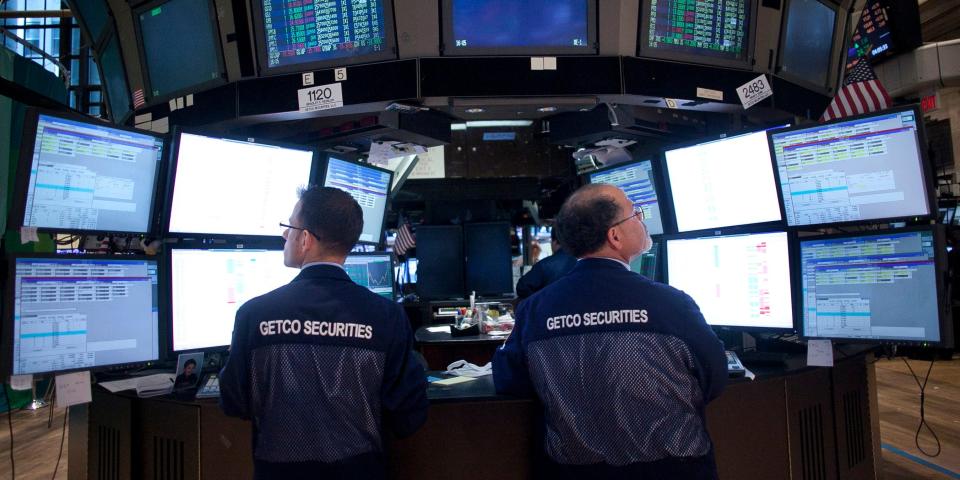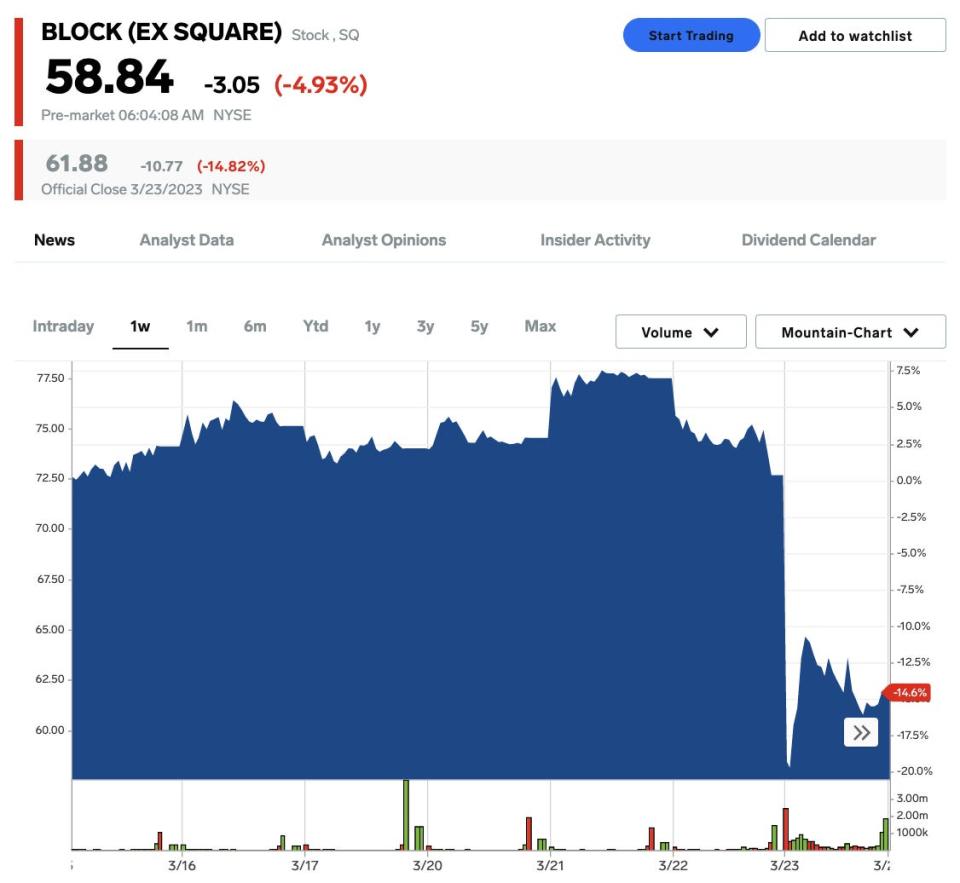A key indicator says a recession is guaranteed in 2023 — and Bill Ackman, Nouriel Roubini, and others are warning of trouble ahead
Happy Friday, team. I'm Phil Rosen — after a few days cruising the Caribbean (I even spent time in Sam Bankman-Fried's old stomping grounds) it's good to be back.
From the central bank's latest rate hike to new developments in the ongoing bank crisis, a lot has happened in my absence.
Jerome Powell and co. indicated Wednesday that, financial turmoil or not, more rate hikes could be coming this year.
Markets, on the other hand, expect something else entirely. Futures are pricing in a minimal chance that the Fed's target rate will be the same or higher by 2024, according to CME's FedWatch tool.
This means the Fed and investors are on dramatically different pages (and only one can be correct).
And all the while, Jerome Powell's favorite bond-market indicator is quietly telling us that a recession is all but guaranteed this year.
If this was forwarded to you, sign up here. Download Insider's app here.
1. Powell's preferred Treasury indicator is the spread between the yield on three-month Treasury bills and their expected yield in 18 months' time.
On Thursday, the spread inverted by a record 134 basis points. That's steeper than the previous record set in January 2001, two months before a recession struck, Bloomberg reports.
Talk of basis points, yield spreads, and other market jargon is obscuring the key message here: Markets think a recession is guaranteed in 2023.
Remember, an inverted yield curve suggests investors see more risk in the near term. It's a classic warning for a downturn.
Here's how Powell described the indicator last year:
"Frankly, there's good research by staff in the Federal Reserve system that really says to look at the short — the first 18 months — of the yield curve. That's really what has 100% of the explanatory power of the yield curve. It makes sense. Because if it's inverted, that means the Fed's going to cut, which means the economy is weak."
Again, the policymakers said this week that interest rates will remain elevated through the year, although Powell did note that trouble with Silicon Valley Bank, Signature Bank, and other firms could help the Fed achieve its goals by tightening credit conditions.
Meanwhile, billionaire investor Bill Ackman echoed the warning of the bond market gauge, saying that the economy's on track for more pain.
"When combined with the higher cost of debt and deposits due to rising rates, consider what the impact will be on lending rates and our economy," he wrote in a tweet. "The longer this banking crisis is allowed to continue, the greater the damage to smaller banks and their ability to access low-cost capital."
"Trust and confidence are earned over many years, but can be wiped out in a few days. I fear we are heading for another train wreck. Hopefully, our regulators will get this right."
To "Dr. Doom" economist Nouriel Roubini, the US is spiraling toward a "Bermuda Triangle" of risk.
In a recent podcast interview, Roubini said another financial crisis is at stake with policymakers set on tightening policy.
"You have a hit to your income, to your asset values, and then to the burden of financing your liabilities," he explained. "And then you end up in a situation of distress if you're a highly leveraged household or business firm. And when many of them are having these problems, then you have a systemic household debt crisis like [2008]."
How much credence as a recession signal do you give the bond market indicator? Tweet me (@philrosenn) or email me (prosen@insider.com) to let me know.
In other news:
2. Deutsche Bank shares fell sharply early Friday following a spike in credit default swaps, fueling concerns about the stability of European banks. Here's the full story.
3. On the docket: Smiths PLC, Xiaomi, and more, all reporting.
4. A "boxed-in" Fed will tank stocks from dot-com-level valuations after it raises rates. That's according to Morgan Stanley Wealth Management's CIO. She shared the best five areas in the market to find safety amid the uncertainty.
5. The SEC's recent moves against Coinbase and celebrity endorsers shows the regulator is serious about clamping down on crypto. The SEC said it's "neutral about the technologies at issue," but added that it's "anything but neutral when it comes to investor protection." Celebrities including Lindsay Lohan, Jake Paul, Lil Yachty, and Soulja Boy have all been hit with SEC charges.
6. It's time to buy up international stocks because of all the chaos in US markets, according to Richard Bernstein Advisors. The investment manager pointed to recent volatility stemming from the bank failures as reason for caution — and said US equities could cost nearly double their international counterparts.
7. The prices of Donald Trump's NFTs spiked following reports of the former president's looming arrest. On news of a potential indictment, sales of his line of non-fungible tokens spiked by double-digit percentages. Buyers were previously entered in a sweepstakes to win a 20-minute meeting with Trump at Mar-a-Lago.
8. Meet a 28-year-old who puts away 100% of his salary and lives off his side-hustle income. "Super saver" Avery Heilbron said he stashes away almost every penny in a high-yield savings account. He shared his full savings strategy with Insider.
9. Veteran investor Jonathan Hirtle launched his $19 billion firm in the wake of the 1987 crash. He said the current bank crisis isn't a redux of that era, or even of 2008. He explained what's different — and what he's holding onto right now.
10. Shares of Block tumbled Thursday after short-seller Hindenburg Research indicated the company has "wildly overstated" genuine user numbers. The firm said its two-year investigation into the company showed Block "obfuscates" its volume of Cash App customers. Get the full details.
Curated by Phil Rosen in New York. Feedback or tips? Tweet @philrosenn or email prosen@insider.com.
Edited by Max Adams (@maxradams) in New York and Hallam Bullock (@hallam_bullock) in London.
Read the original article on Business Insider

 Yahoo Finance
Yahoo Finance 


